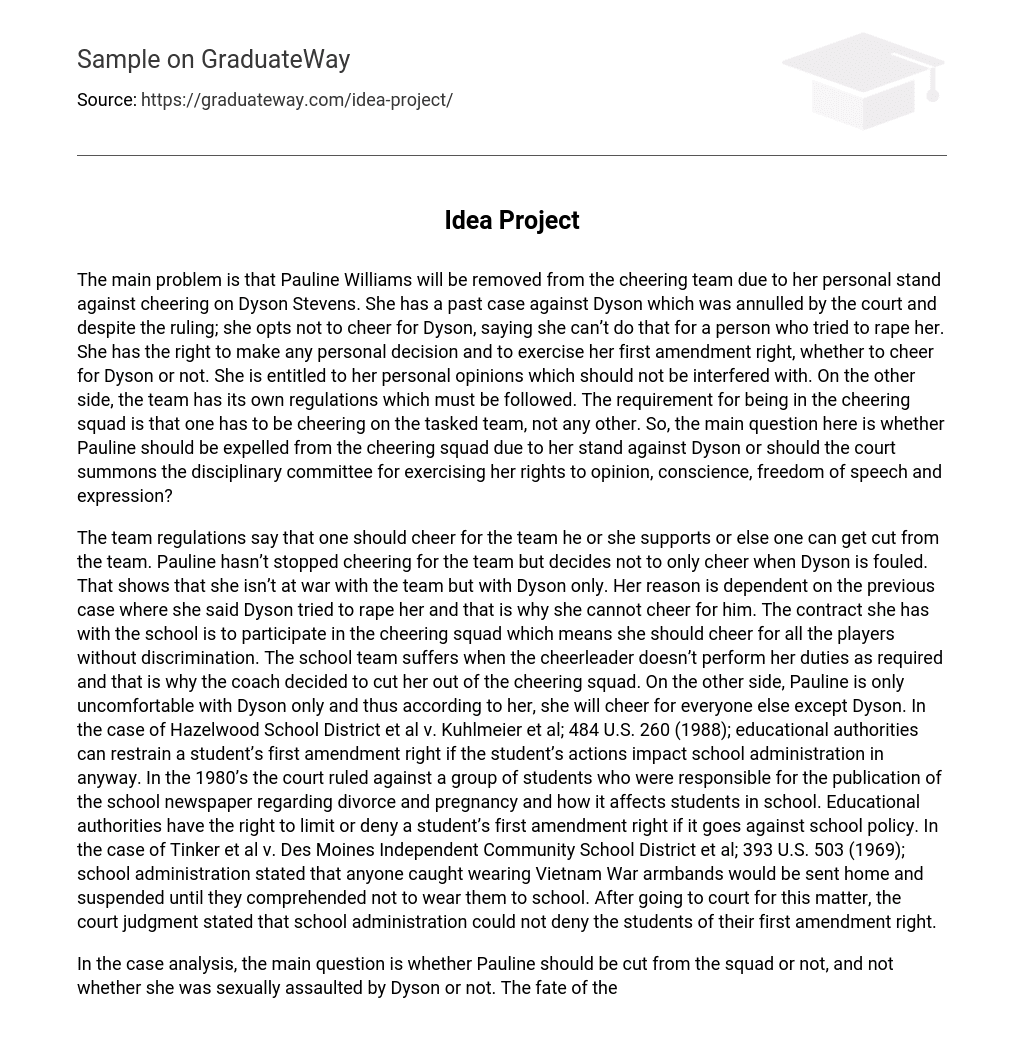The main problem is that Pauline Williams will be removed from the cheering team due to her personal stand against cheering on Dyson Stevens. She has a past case against Dyson which was annulled by the court and despite the ruling; she opts not to cheer for Dyson, saying she can’t do that for a person who tried to rape her. She has the right to make any personal decision and to exercise her first amendment right, whether to cheer for Dyson or not. She is entitled to her personal opinions which should not be interfered with. On the other side, the team has its own regulations which must be followed. The requirement for being in the cheering squad is that one has to be cheering on the tasked team, not any other. So, the main question here is whether Pauline should be expelled from the cheering squad due to her stand against Dyson or should the court summons the disciplinary committee for exercising her rights to opinion, conscience, freedom of speech and expression?
The team regulations say that one should cheer for the team he or she supports or else one can get cut from the team. Pauline hasn’t stopped cheering for the team but decides not to only cheer when Dyson is fouled. That shows that she isn’t at war with the team but with Dyson only. Her reason is dependent on the previous case where she said Dyson tried to rape her and that is why she cannot cheer for him. The contract she has with the school is to participate in the cheering squad which means she should cheer for all the players without discrimination. The school team suffers when the cheerleader doesn’t perform her duties as required and that is why the coach decided to cut her out of the cheering squad. On the other side, Pauline is only uncomfortable with Dyson only and thus according to her, she will cheer for everyone else except Dyson. In the case of Hazelwood School District et al v. Kuhlmeier et al; 484 U.S. 260 (1988); educational authorities can restrain a student’s first amendment right if the student’s actions impact school administration in anyway. In the 1980’s the court ruled against a group of students who were responsible for the publication of the school newspaper regarding divorce and pregnancy and how it affects students in school. Educational authorities have the right to limit or deny a student’s first amendment right if it goes against school policy. In the case of Tinker et al v. Des Moines Independent Community School District et al; 393 U.S. 503 (1969); school administration stated that anyone caught wearing Vietnam War armbands would be sent home and suspended until they comprehended not to wear them to school. After going to court for this matter, the court judgment stated that school administration could not deny the students of their first amendment right.
In the case analysis, the main question is whether Pauline should be cut from the squad or not, and not whether she was sexually assaulted by Dyson or not. The fate of the previous case was determined by the court where no charges were placed against Dyson. So, for Pauline to use that as the reason for not performing her duties is nullified since Dyson was not proven guilty. The school administration is going against the basic rights to personal opinion and conscience. But, does the constitution offer the limits for such rights? No. No one’s rights should overstep the other person’s rights. The complainant has the right to her opinions and feelings; she can’t cheer for a person who tried to rape her. The Supreme Court adopted the Tinker et al v. Des Moines Independent Community School District et al; 393 U.S. 503 (1969); which sought to protect the freedom of speech and expression of the students, a point which can be considered. But, the school has a contract of performance and regulations which she must adhere to. She was appointed by the school and thus the mandate to rip her from the position is under the school administration. The terms and conditions for her appointment might be used against her in the case. For the school team to perform, the cheerleader must perform her duties; cheering for all the member of the team inclusively without discrimination. Her conduct was meant to “materially and substantially disrupt the work and discipline of the school,” as denoted in the Hazelwood School District et al v. Kuhlmeier et al; 484 U.S. 260 (1988) case.
In conclusion, I believe that Pauline will lose the case if she files a case against the school administration on her withdrawal from the squad. The reason why she was cut from the team is because she wasn’t cheering for all of the players. The contract doesn’t consider personal differences but rather the performance of the cheering squad. Personal differences shouldn’t affect the performance of the team. So, I would discourage her from presenting the case before the court.
References
- Tinker et al v. Des Moines Independent Community School District et al; 393 U.S. 503 (1969).
- Hazelwood School District et al v. Kuhlmeier et al; 484 U.S. 260 (1988).





